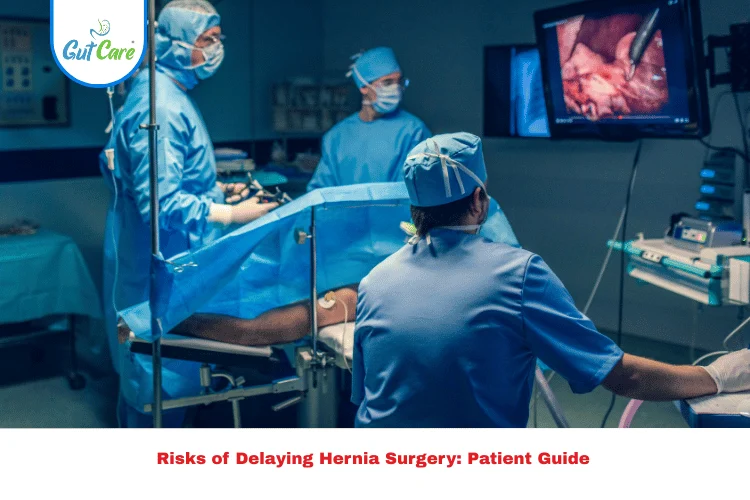One of the most common questions patients ask is, “Is hernia pain constant, or does it come and go?” The truth is, hernia pain doesn’t feel the same for everyone. For some, it’s only a dull ache after lifting something heavy. For others, the pain can become sharp and persistent, interfering with daily life.
At Gutcare Clinics in Bangalore, under the care of Dr. Yuvrajsingh Gehlot, patients often come in worried about whether the pain they feel is normal or a sign of something more serious. This article explains what hernia pain really feels like, why it changes, and when you should see a doctor.
What Exactly Is a Hernia?
A hernia develops when part of an organ or tissue bulges through a weak spot in the muscle or connective tissue. It usually appears as a visible lump or swelling. The most common types are:
- Inguinal hernia: Occurs in the groin and is the most frequent type.
- Umbilical hernia: Appears around the belly button.
- Hiatal hernia: Happens when the stomach pushes upward into the chest cavity.
- Incisional hernia: Forms at the site of a previous surgery.
While some hernias are small and painless at first, others can grow larger and cause ongoing discomfort.
Is Hernia Pain Constant?
The simple answer: hernia pain is not always constant.
- Early stages: Many people don’t feel much pain at all, just a small bulge or mild pressure.
- Intermittent pain: Over time, pain may come and go. It’s usually worse after standing, lifting, coughing, or eating a heavy meal.
- Constant pain: If the hernia gets bigger or part of the tissue becomes trapped (called incarceration or strangulation), the pain can turn sharp, severe, and constant.
Key point: Mild hernias often cause on-and-off pain, but a worsening hernia can lead to constant discomfort — and that’s when medical care becomes urgent.
What Makes Hernia Pain Worse?
People often notice that certain activities bring on or intensify the pain. These include:
- Lifting heavy objects
- Straining during bowel movements
- Chronic coughing or sneezing
- Standing or walking for long periods
- Eating large meals (especially with hiatal hernia)
Learning to recognize these triggers can help you manage symptoms until you see a specialist.
When Should You See a Specialist?
Not every hernia is an emergency, but it’s always a condition that needs attention. You should see a specialist like Dr. Yuvrajsingh Gehlot if you experience:
- Sudden, constant hernia pain that doesn’t improve
- A bulge that is tender, hard, or can’t be pushed back in
- Nausea, vomiting, or bloating
- Difficulty passing stool or gas
These are warning signs of a strangulated hernia, a serious condition that requires immediate surgery.
How Can Hernia Pain Be Managed?
While surgery is the only way to fully repair a hernia, there are ways to reduce pain in the meantime.
Lifestyle Adjustments
- Avoid heavy lifting and sudden strain.
- Maintain a healthy weight to reduce abdominal pressure.
- Eat smaller meals to ease symptoms of hiatal hernia.
- Wear a supportive belt if recommended by a doctor.
Medical Treatment Options
- Medication: Pain relief or acid-reducing medicines for hiatal hernias.
- Surgical repair: The most effective and lasting solution. Options include minimally invasive laparoscopic surgery or open surgery, depending on the case.
At Gutcare Clinics in Bangalore, Dr. Yuvrajsingh Gehlot helps patients choose the safest and most effective treatment tailored to their condition.
Why Choose Gutcare Clinics, Bangalore?
Dealing with hernia pain can be stressful, but having the right medical team makes a huge difference. At Gutcare Clinics, patients benefit from:
- Accurate diagnosis using modern imaging
- Expert care from Dr. Yuvrajsingh Gehlot, a trusted gastrointestinal specialist
- Advanced surgical techniques for quicker recovery
- Supportive post-treatment care and follow-up
This patient-centered approach ensures both symptom relief and long-term health.
Summary
So, is hernia pain constant? Not always. In many cases, it comes and goes, but if the hernia grows or gets trapped, the pain may become constant and severe. Ignoring these symptoms can be dangerous.
The best approach is to get evaluated by an experienced specialist. If you’re in Bangalore, Gutcare Clinics offers expert diagnosis and treatment under the guidance of Dr. Yuvrajsingh Gehlot. Don’t wait for hernia pain to worsen — timely medical care ensures faster relief and prevents complications.
FAQs About Hernia Pain
1. Is hernia pain constant or does it come and go?
Hernia pain is usually intermittent at first but can become constant if the hernia enlarges or becomes complicated.
2. What activities make hernia pain worse?
Heavy lifting, straining, coughing, and eating large meals often trigger or worsen hernia pain.
3. When should I see a doctor for hernia pain?
If you notice constant pain, nausea, or a lump that won’t go back in, see a specialist immediately.
4. Does Gutcare Clinics in Bangalore provide hernia surgery?
Gutcare Clinics, led by Dr. Yuvrajsingh Gehlot, provides advanced surgical and non-surgical treatment options for hernia patients.
5. Can lifestyle changes cure hernia pain completely?
No, lifestyle changes may ease discomfort, but surgery is usually needed to fix the hernia permanently.




